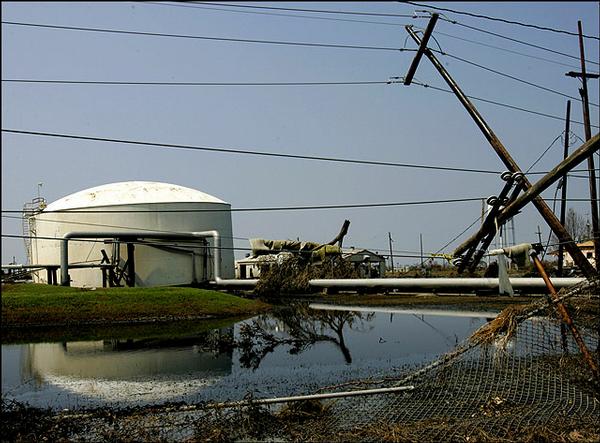The question now is what did Katrina do to affect this industry? We all remember the soaring gas prices and the oil panic in Katrina's immediate aftermath. The flooding of New Orleans was indirectly caused by this ecosystem damage from the industry, but did Mother Nature wipe out its own enemy with hurricane Katrina?

repairwork being done on a NOLA levee by the US Department of Defense.
Environmental chemistry states that recovery is not about fixing the levees. There is discussion about replacing silt to the wetlands in a controlled way to eliminate the need for flooding the area, but the wetlands could be slowly replaced by controlled flooding done by a dam. The new sediments would offset the sinking of NOLA, and perhaps lessen the drastic consequences of the next hurricane.

statistics of the oil industry as of December 2005 (immediately following Katrina). courtesy of the Energy Information Administration.
The oil industry itself across the Gulf of Mexico experienced the temporary closing of 9 refineries, most for well over a week, and 2 permanently (there were only 20 total across the Gulf). The US weekly oil supply reduced by eight percent. The US tapped into the emergency oil reserves to help soften to blow to consumers. Slowly in the weeks following the store, companies were able to restart their refineries after the destroyed pipes, platforms and moorings were fixed, but not for long before lawmakers and industrial analysts could point out how strained the refineries themselves were in the first place, susceptible to spills, fires, and malfunctions. There has not been a new refinery built in the US since 1976 due to political and environmentalist opposition.

an oil refinery after Katrina (notice some oil on the water). image courtesy carleton.edu.
Regardless of these barriers to expansion and recovery, output is on the rise since January of 2006. The Bush administration has sought $105 billion for repairs of the oil refineries and to fight off these obstacles toward rebuilding. Besides the collection and refining of the crude oil, the shipment of it became substantially difficult after Katrina. When the first refineries were back in operation, much of the oil had to be shipped around - to Corpus Christi, TX, causing more delay in getting the oil back to the rest of the nation.
The oil industry has been much faster to bounce back than the tourism industry, partially because there is more funding for it since it is much more of a nationwide issue. As it turns out, the oil industry is carrying NOLA right now, even after its steady 30-year decline. Ironically, the very industry that destroyed the foundation of the city is supporting its (non)recovery. In my last post about the tourism industry, the general consensus is that in order to generate tourism in a productive way, Katrina must be considered part of the NOLA identity and the identity must be reestablished.
There is opposition to the oil industry defining the identity of the new NOLA, just as there is opposition to the occurence of Mardi Gras. Residents feel that more emphasis is being placed on the oil industry than their displacement and individual struggles. This is a two-sided problem: the economy (and therefore reconstruction) of NOLA is dependent on these two major industries being in tact, but money is being stretched so thin that when people have nowhere to live, there is no one to work these oil rigs and tourist traps. There is a perfect balance that must be achieved to give the economy just the boost it needs while addressing the problem of the displaced residents.
sources:
"New Orleans, Hurricane Katrina, and the Oil Industry": environmentalchemistry.com
"Hurrican Katrina Underscores Tenuous State of U.S. Oil": pbs.org

No comments:
Post a Comment